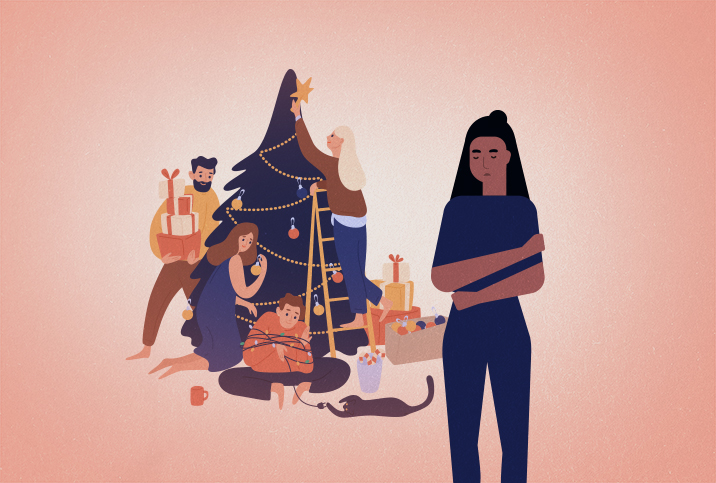How to Protect Your Mental Health During the Holidays

Often dubbed "the most wonderful time of the year," the holiday season is supposed to be one of merriment and magic. But for many, the weeks from Thanksgiving to New Year are rife with stress, anxiety and depression.
According to a survey by the American Psychological Association, 44 percent of women and 33 percent of men reported feeling stressed during the holidays. The season may be even more challenging for those with a diagnosed mental illness. The National Alliance on Mental Illness (NAMI) reported about 24 percent of people with a diagnosed mental illness find the holidays make their condition "a lot" worse. Almost half, 40 percent, report their condition is "somewhat" worse during the "happiest time of the year."
"The holiday season can touch on many areas of stress in a person's life—financial stress, as well as relationship or family stress," said Julie Geeting, LPC, an NCC counselor and coach at PALM Health. "There's often an increase in expectations, an increase in focusing on what others are doing, higher demands at work and overall time commitments. And in case we need to add anything to all of that, in many places, there is less sunlight, less time outside and therefore less contact with nature and less movement for our bodies. This all has a big impact on our ability to cope and manage our lives."
'It's a whole season that makes you remember that maybe you don't have the skill set to be with other people, and that can be very challenging.'
For some, the same elements that bring about holiday magic can also give rise to grief.
"The holidays always come with memories," said Nakeya T. Fields, founder and chair of the board at the Therapeutic Play Foundation. "We remember the smells of cooking from our grandparents, that one Christmas gift that got us excited, or the traditions that our families do every year. These traditions become a part of our routine, and our bodies and minds are reliant on structure and routine. The holidays bring back these memories through association, and for some of us, those associations cause grief. Maybe you have lost the person that you share a memory with, or you do not have access to the same routines or traditions that you are used to anymore. Because society has conditioned us to believe that the holidays are a time that we are supposed to be connected with others and focus on relationships, we can be more aware of our own loneliness. If you have a mental illness, then you may have difficulty even building those relationships to have during the holidays in the first place. It's a whole season that makes you remember that maybe you don't have the skill set to be with other people, and that can be very challenging."
Like Coleridge's sailor stranded at sea, "water, water everywhere, but not a drop to drink," living with mental illness at the holidays, surrounded by mystical reverie while feeling overwhelmingly miserable, can be torturous, though it doesn't have to be. We talked to seven experts who shared their tips for having a healthier, happier holiday.
Who's most at risk?
Experts say grieving people and those with depression or anxiety disorders, eating disorders or substance use disorders are most likely to be affected negatively by the holiday season.
"I often tell my clients that when people are depressed, they get stuck in the past, and when people have anxiety, they are worried about the future and getting stuck in the what-ifs," Fields said. "During the holidays, people are actively doing both. If you have a predisposition for being sad, anxious or depressed, the holidays can be especially triggering."
However, anyone can experience holiday-related stress and dispiritedness.
"Most, if not all, mental or physical health diagnoses will be negatively impacted by chronic stress, and in this case, extended holiday stress," Geeting said. "Those prone to burnout and overgiving, overdoing and general overextending of themselves definitely struggle."
The continual onslaught of COVID-19 and multiple environmental, social and political crises have exacerbated stress and mental illness symptoms for millions and caused new ailments to arise in many more. According to the Kaiser Family Foundation, as of February 2021, about 40 percent of U.S. adults reported symptoms of anxiety or depression, compared to 10 percent who reported such symptoms in early-to-mid 2019.
For some, the effects are a direct result of contracting COVID-19. However, the virus' influence extends beyond the infected. Fields noted that part of the virus' impact comes from the way it abruptly obliterated many individual and collective normative routines.
'If you have a predisposition for being sad, anxious or depressed, the holidays can be especially triggering.'
"No one planned for this disruption, and it came in like a hurricane," Fields explained. "It wiped away our routines when it comes to what we did for fun, what we did to practice self-care and much more. Mental health is the ability to adjust to a change in routine. If you have never practiced mental wellness, or you were never mentally well, and you came into a space where you had to adjust to rapid transitions in your life, then it can feel very stressful and overwhelming."
"The baseline stress level and tension in the world is higher," Geeting said. "Each of us can feel it, either consciously or unconsciously, and it is influencing our capacity to manage the day-to-day stress in our lives, particularly around the holidays. We are still living through an extended, global trauma. The impact of this is no small thing."
In addition to compounding collective stress and despair, the pandemic and corresponding world events have increased social isolation, another common precursor to depression. Aside from lockdowns, quarantines and social-distancing measures, many people have withdrawn from family or communities due to discord over sociopolitical issues.
"People are feeling hopeless," said Allie Sauls, M.A., LPC, of Heritage Behavioral Health Consultants. "We take 10 minutes to watch the news and we're basically told that everything is falling apart—everything is awful, nothing is good. Politics and topics I eloquently file under 'sex, drugs, and rock and roll' have always been known as ones to avoid at Christmas dinners. COVID comes along and adds a whole new layer to topics to avoid.
"Unfortunately, COVID has created gigantic chasms within communities and families all over the U.S.," she added. "Who's vaccinated, who's not? Who's been masking? Who thinks masks are pointless? Issues like climate change, politics and COVID are potentially serving as yet another reason for a person to dread Christmas dinner with the entire family."
Tips for coping
One person's coping techniques, such as their holiday customs, may vary vastly from another's, but there are some fundamental strategies most people can benefit from.
"How we respond to stress in our lives matters," Geeting said. "Self-care is a foundational tool for mental health. Commit to your sleep routine, eat nutritious food as often as you can during the holidays, drink plenty of water and move your body."
In addition to practicing healthy habits and generally making wellness a priority, experts suggest the following.
Practice mindfulness and grounding
Mindfulness meditation and exercises can allay stress, depression and anxiety symptoms, and improve overall mental health. Such techniques can also help you stay grounded to better cope with stressful situations.
"Remember that emotions don't last forever—they are temporary," Fields said. "If you can create a strategy for yourself for when you have a passing thought that feels sad or anxious, etc., to be able to notice it, examine it and then let it go, that can be very helpful. Most emotions actually only last about 90 seconds, so if you can find something to distract yourself to get through those couple of minutes, the thought has most likely already passed. Then you can move on to choose a healthier, more productive thought for yourself."
Coach and consultant Daryl Appleton, Ed.D. in leadership, M.Ed. in counseling, recommended putting together an "emotional relief kit," a small bag containing one or more items to engage one or more senses. For instance, peppermint gum for taste, essential oils or lotions for scent, a worry stone for touch, a feel-good playlist for hearing or a coloring book for sight.
"When my clients get overwhelmed, I teach them to redirect their emotions into something tangible in the moment," Appleton explained. "While this is not going to fix all the problems, it can act as a grounding agent and help a wave of anxiety or symptoms of PTSD, etc., be less intense."
Set realistic expectations
There's nothing wrong with hope and optimism, but expecting an idealistic, Insta-worthy holiday is a recipe for disappointment.
"The holidays are chock-full of unrealistic expectations," Sauls said. "We are expected to spend a ton of money on meaningful, thoughtful gifts for every person in our lives. Our homes are supposed to be immaculately decorated with the classiest holiday decor. We're supposed to enjoy a week of distant relatives in our homes or travel hours to be with people we see once a year. And, of course, do all of this with a huge smile on our faces. The holidays are treated as a time to be joyful and carefree. The reality is often quite the opposite. When we buy into unrealistic expectations, we're setting ourselves up for a special type of failure that is a breeding ground for shame."
Instead, Sauls advises expecting the unexpected, embracing imperfections and practicing compassion toward yourself and others.
'When we buy into unrealistic expectations, we're setting ourselves up for a special type of failure that is a breeding ground for shame.'
"We have in our heads this idea of how the holidays 'should' be and rarely give ourselves grace when we can't live up to that ideal," Sauls added. "We all want rainbows and butterflies, but that's not real life. Real life is messy and chaotic, and if we allow ourselves to see the beauty in that, we have a much better chance of not getting thrown off-kilter."
For example, for those estranged from biological relatives, Sauls recommends celebrating with a "chosen family." Or, if traditional holiday festivities don't bring you joy, ditch them altogether.
"You're not tied down to do holidays the same way you did growing up or the way they do it in Hallmark movies," Sauls said. "So go order some Chinese take-out and get together with your neighbor, bestie or your cat and plan a fun-filled trip to Cancun—or Galveston!"
Plan ahead
The holidays are a marathon, not a sprint. Prioritizing and planning can go a long way to diminish stress and avert triggers. Experts advise deciding in advance what events you'll attend and what activities you'll partake in while ensuring you have plenty of time for rest and recharging. Write everything in a calendar or planner, and set reminders as needed.
"Plan ahead if possible," Geeting said. "Schedule time for meaningful self-care, supportive activities or practices you have that help you feel recharged. They do not have to be heavy time investments. For example, a regularly practiced five-minute breathing technique can make a big impact on your physiological stress level."
For those with an uncle prone to political outbursts or an aunt too interested in your love life, Erin O'Callaghan, director of therapy and clinical psychologist at Brightside Medical, suggests preparing specific responses to halt contentious conversations before they start.
"For example, if a relative asks, 'Why are you still not married yet,' you can have a response prepared like, 'I'm not comfortable discussing my love life, but I did notice that there are some great desserts lined up for after dinner. Which one looks most delicious to you?'" O'Callaghan said. "Also, if topics like politics, finances or current events come up, and you would prefer not to engage with family members on these issues because it leads to arguments or hurt feelings, you could come prepared to the holiday gathering with 'safe' topics to discuss, like favorite TV shows/movies, music, vacation plans or favorite local restaurants."
Planning an exit strategy is imperative, too. This includes identifying places for momentary respite and deciding when you'll leave an event ahead of time.
"This may be having backup plans for where you are staying when traveling or visiting family or friends," said Christopher Taylor, Ph.D., LPC-S. "Or having a designated place where you can go when needed to take some deep breaths and meditate, like your backyard or a room where you can close the door and be alone."
O'Callaghan noted that this strategy will help limit your time spent with difficult family members while setting up honest expectations for others in attendance about how long you will be present at the gathering.
Eat and drink mindfully
"Be sure to have fun, eat and be merry, but always practice moderation, whether it is in your eating or drinking," Taylor said.
Indulging may assuage feelings of sadness or frustration temporarily. However, overdoing it will only serve to make things worse.
Surrounded by treats baked in nostalgia and iced with the promise of comfort and joy, anyone would find eating healthfully during the holidays a challenge. But for those with eating or substance use disorders, it can be downright torturous. To alleviate stress and mitigate triggers, Taylor advises integrating support into your routine.
"This may mean planning support group meetings to attend ahead of time, or making plans for texts or phone calls with members of your support system," Taylor said.
Taylor also recommends having a list of three to five coping skills you can implement when a craving or urge arises and checking in with yourself to identify why you're experiencing these desires.
"Ask, 'What am I feeling in this moment?' and 'What would be most of service to me?'" he explained. "Identifying your emotions can often help in decreasing their intensity."
Set boundaries
Appleton describes boundaries as the distance in which you can love yourself and another person. She recommends using a three-step process to set them: validate, set a boundary and set a consequence.
"For instance: 'I know you are trying to show me you care by asking me about my therapy appointments, but I am not comfortable discussing them in front of our entire family at Christmas. If the situation does come up and I excuse myself from the table, that is why,'" Appleton clarified. "It is not something that always comes naturally, so it does take practice."
Setting boundaries can also entail abstaining from certain activities to avoid burnout and overexertion.
"At this time of year, I tell my clients not to do anything that hurts. Meaning, if you are in a fragile state, please don't go above and beyond anything that will make you feel worse. If you broke your ankle, your doctor would tell you something similar," he added. "Understand your pain tolerance at this point and navigate it accordingly. Sometimes while we are already not feeling our best, it sets us back more to try and take on too much."
Whatever boundaries you need to establish, be sure to create and rehearse them beforehand, rather than waiting until you're in a triggering situation. If necessary, experts recommend recruiting a trusted ally to remind you of your boundaries and help you stay accountable.
How to talk about mental illness
You don't owe anyone an explanation about your mental or physical state. However, if you feel it might be helpful to discuss what you're going through and are concerned others might not understand, experts recommend sharing online resources or inviting loved ones to therapy sessions.
Using analogies, like the Spoon Theory, may be helpful too. This was based on the personal story of Christine Miserandino, who theorized that everyone has an amount of energy to deal with the day—a spoon represents a unit of energy. In her particular case, Miserandino dealt with lupus and did not have as many spoons as she would have liked to get through the day.
Again, managing expectations is crucial, but you may be pleasantly surprised.
"Believe me that once you can say with confidence that you struggle with a monumental challenge to everyday living—a struggle that others typically don't worry about—the people who love you will get onboard. They're likely to respect you more for your capacity not only to endure it but to tell them about it with authority and for truly owning it," said David Rakofsky, a psychologist and president of Chicago-based Wellington Counseling Group. "Describing non-defensively how you cope in the face of your adversity is a great reminder to others of the great diversity of human strengths surrounding them every day."
If you experience symptoms of depression for more than two weeks, consider talking to a mental healthcare provider, such as a licensed therapist, psychologist or psychiatrist. For help finding resources, call the Anxiety & Depression Association of America (1-240-485-1001) or the National Alliance on Mental Illness (1-800-950-6264).


















